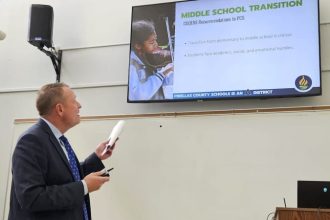The Trump Administration has announced it will partially fund Supplemental Nutrition Assistance Program (SNAP) benefits through November, after two federal judges ordered the administration to continue the program’s funding.
SNAP, which provides food assistance to more than 1.4 Georgians and around 1 in 8 people nationwide, was set to pause this past Saturday amid the government shutdown, which just hit day 34 on Monday.
On Friday, two federal judges ordered that the Trump Administration, specifically the U.S. Department of Agriculture (USDA), to tap into funds to keep the program afloat. The administration previously said it had no plans to dive into the billions of dollars in contingency funds before the rulings.
The rulings gave the Trump administration until Monday afternoon to decide whether to partially or fully fund SNAP benefits for November. A filing from Monday says that USDA will “fully comply” with the judges’ rulings and create a table “to calculate the benefits available for each eligible household in that State.”
The USDA was essentially given two options: tap into the Section 32 Child Nutrition Program to fully fund SNAP benefits for November, or drain the $4.65 billion in contingency funds to partially fund SNAP for the month. The administration went with the latter.
“Ultimately, USDA has determined that Section 32 Child Nutrition Program funds must remain available to protect full operation of Child Nutrition Programs throughout the fiscal year, instead of being used for SNAP benefits,” a filing read. “Section 32 Child Nutrition Program funds are not a contingency fund for SNAP. Using billions of dollars from Child Nutrition for SNAP would leave an unprecedented gap in Child Nutrition funding that Congress has never had to fill with annual appropriations, and USDA cannot predict what Congress will do under these circumstances.”
RELATED: GA SNAP Payments Ordered During Government Shutdown, Courts Say
Officials said that more than $8 billion is needed to fully fund the program through November, nearly double what’s in the contingency fund.
The draining of the contingency fund has the administration worried that “no funds will remain for new SNAP applicants certified in November, disaster assistance, or as a cushion against the potential catastrophic consequences of shutting down SNAP entirely,” according to the USDA.
Gov. Brian Kemp previously told reporters he was worried that if he spent Georgia’s $14 billion surplus to help with the loss of SNAP, the funding may not get reimbursed. The feds have said they are not required to return money to states if they step in and aid the impending crisis.
Last week, he cast blame on Democrats for the lasting shutdown, specifically Georgia-based U.S. Sens. Jon Ossoff and Rev. Raphael Warnock. The governor has been adamant about Congress ending the stalemate.
It was not made immediately clear when the EBT cards, the debit cards that those enrolled in SNAP use to buy groceries, will be reloaded.
With the shutdown entering its second month, it is also unknown when Congress will choose to reopen the government – impacting federal agencies beyond SNAP.
Finding Resources During Shutdown
Georgia officials have created an online hub of resources for federal workers affected by the shutdown. Congresswoman Lucy McBath, representing Georgia’s sixth district, also shared online resources for impacted federal workers.
Workers needing assistance with food may benefit from the Georgia Emergency Food Assistance Program.
The Atlanta Community Food Bank on Thursday said it is planning to tap into $5 million of its reserves to buy 6 million pounds of emergency food as part of a crisis response plan. The bank operates four community food centers in metro Atlanta.
“When the federal government shuts down, families, federal workers, and seniors suddenly face tough choices. Together, we can help families stay nourished through the unexpected,” the ACFB tweeted on Oct. 7, shortly after the shutdown was announced.
Feeding Georgia operates food banks statewide, including the ACFB and Second Harvest Coastal Georgia.
A list of local food banks are available via the Georgia Department of Community Affairs.
For more information on SNAP, Georgians can visit the Georgia Department of Human Services website.
SNAP Benefits Partially Restored: What It Means For GA originally appeared on the Atlanta Patch









